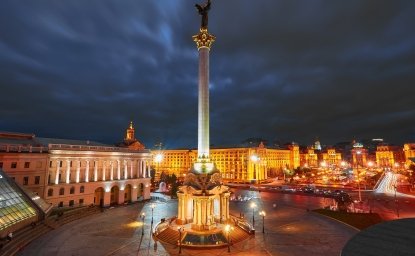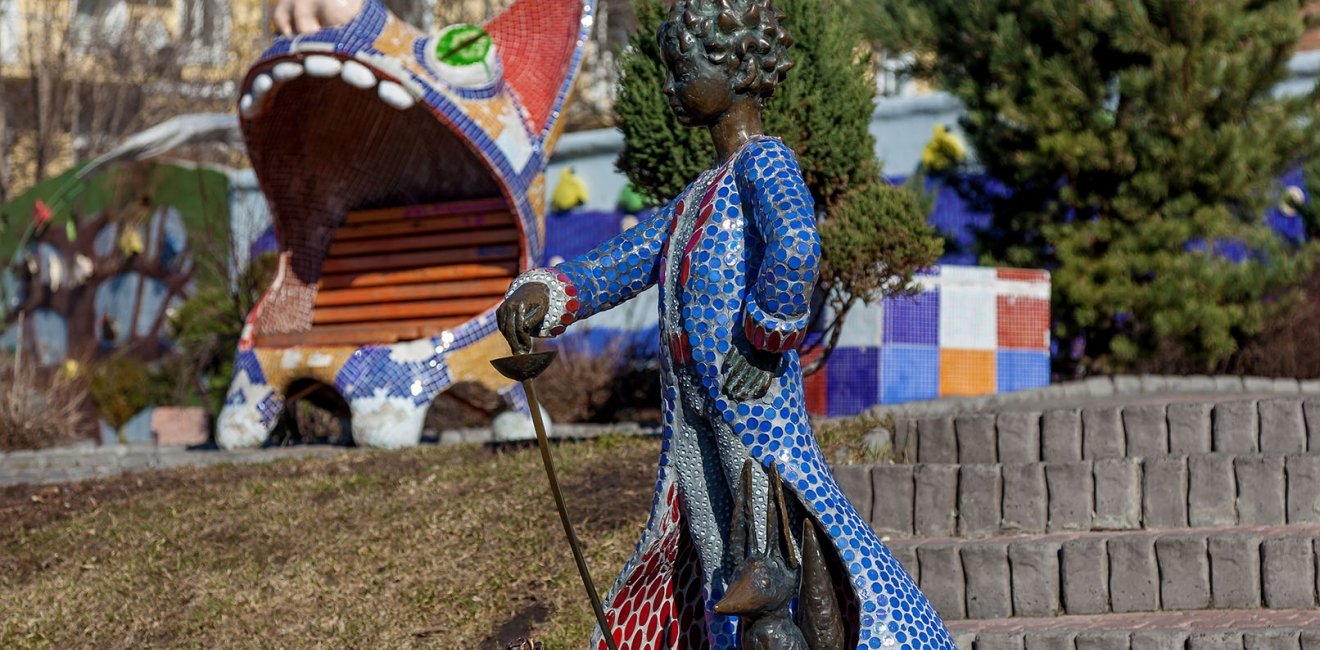
A blog of the Kennan Institute
World War II was well underway when French writer, illustrator, and aviator Antoine de Saint-Exupéry penned The Little Prince while in exile in Quebec and New York. Among the best-selling books in history, and translated into over 500 languages, The Little Prince presents adult musings about the human condition even as it enchants children with an extraordinary journey around the world and the universe. Saint-Exupéry’s fable speaks to the distress of war and exile through child eyes as much as it tells the story of his plane crash in the Sahara a few years before. How fitting, then, that the Kyiv Modern Ballet Theater's dance based on this book is being performed now.
The ballet company is one among many Ukrainian cultural institutions committed to performing despite the restrictions of wartime life, like audiences limited to the size of bomb shelters, performances moved to daylight hours, and performers called to the front or touring abroad. The company’s schedule warns that performances are subject to change up to the minute that the curtain rises. Performances continue nonetheless, because Ukrainians steadfastly seek to limit the control exerted by Russia over their lives.
The Kyiv Modern Ballet Theater, as noted in a previous blog post in this series (April 8, 2022), emerged in 2005, following a commission from Volodymir Fillipov’s Art Foundation of the one-act production Le Forze del Destino. That work, which offered new interpretations of classic opera hits, brought together choreographer Radu Poklitaru and assistant Anatoliy Kozlov, stenographer Andriu Zlobin, costume artist Hanna Ipatieva, lighting designer Olena Antokhina, sound designer Oleksandr Kuriy, and performers who were drawn more to spare modernism than to the overstuffed traditional productions prevalent in the Soviet ballet world.
This group, with continued support from patron Filippov, formed the company within a few months. Their initiative attracted 16 Ukrainian modern dancers schooled in classical dance traditions and set out a distinctive style which they have used ever since. The company struggled to find secure financial footing while it was earning artistic distinction at festivals and on tours abroad. But in 2017, the Kyiv City Council embraced the Kyiv Modern Ballet Theater as a municipal venture, and the theater, in turn, has reached out to the city’s youth as part of its commitment to the city council.
Choreographer Poklitaru has molded the company’s distinctively modernist style. Born into a family of dancers in Chişinău, Moldova, he is one of his generation’s leading choreographers. Trained in Chişinău, Odesa, Moscow, and Perm, he launched his career in Minsk before finding his artistic home in Kyiv, where he has won numerous national awards and has enjoyed international recognition, including success in cinema and television as well as on stage.
The company has continued its pre-war repertoire in recent months, performing at its home theater in the Podil’ neighborhood and elsewhere around the city. These programs include a ballet based on Thornton Wilder’s The Long Christmas Dinner set to the music of Antonio Vivaldi, Maurice Ravel’s Boléro, and “Rain,” a set-less work rewinding time through multiple generations, set to Bach’s The Well-Tempered Clavier.
The COVID pandemic interrupted preparations for Politkaru’s hour-long, two-act The Little Prince, set to music by Mozart and from Ukrainian lullabies. The work’s November 2020 premier on the internet prompted Kyiv News reviewer Anna Arkhipiova to write, “the emotional cocktail created by Rada Poklitary [sic] will affect you for a long time, revealing new and new feelings. The Master invented a unique recipe!” (November 5, 2020). Oleksandr Chepalov, the reviewer for the newspaper Den’, remarked on Poklitaru’s “well-established and well-recognizable ‘brand’ style, which immediately distinguishes him from ordinary ballet masters,” adding that, “without unnecessary pathos, he shows a man-made embodiment of dreams about flight: dozens of paper pigeons” (number 203, 2020).
The Kyiv Modern Ballet Theater’s The Little Prince eventually moved from the internet to the stage, before it closed during the initial months of the Russian invasion. In time, the theater—like other Ukrainian arts organizations—began intermittent public performances. Despite sudden cancellations and delays due to aerial bombardment, the company has continued to present its repertoire. The Little Prince seems even more poignant now, since Saint-Exupéry’s crashed plane, together with war, prompted him to write and to illustrate his remarkable book.
In declaring Ukrainian nationhood and identity, Ukrainians reaffirm one of Saint-Exupéry’s insightful observations: “I am who I am and I have the need to be.” Time and time again, over the past year and a half since the full-scale Russian invasion, Ukrainians have proclaimed that they are Ukrainian and need to be Ukrainian, through words, music, painting, and dance.
The opinions expressed in this article are those solely of the author and do not reflect the views of the Kennan Institute.
Author

Former Wilson Center Vice President for Programs (2014-2017); Director of the Comparative Urban Studies Program/Urban Sustainability Laboratory (1992-2017); Director of the Kennan Institute for Advanced Russian Studies (1989-2012) and Director of the Program on Global Sustainability and Resilience (2012-2014)

Kennan Institute
The Kennan Institute is the premier US center for advanced research on Eurasia and the oldest and largest regional program at the Woodrow Wilson International Center for Scholars. The Kennan Institute is committed to improving American understanding of Russia, Ukraine, Central Asia, the South Caucasus, and the surrounding region through research and exchange. Read more

Explore More in Focus Ukraine
Browse Focus Ukraine
Ukrainian Society Under Occupation: Hardship and Civic Resilience

Creating Rules of the Game for Contemporary Ukrainian Theater

Ukraine Between 1991 and 2022: The Problem of the Blank Canvas

